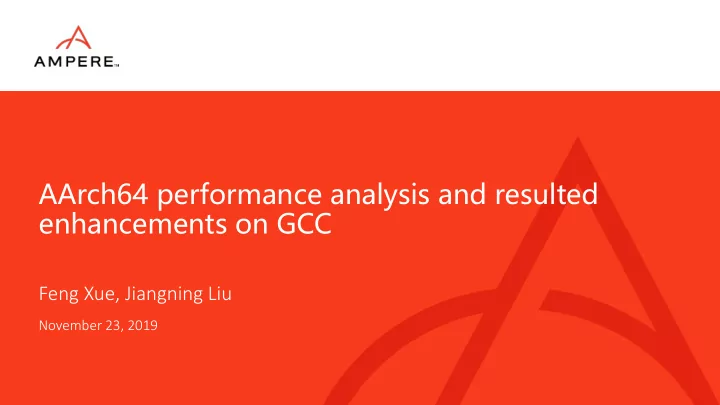

AArch64 performance analysis and resulted enhancements on GCC Feng Xue, Jiangning Liu November 23, 2019
Agenda • Loop split on semi-invariant conditional statement • IPA constant propagation and recursive function versioning • Some issues in current register allocator • Trapless conditional selection instruction generation 2
Loop conditional statement elimination • Loop Split • Loop Unswitch for (i = 0; i < 100; i++) { for (i = 0; i < 100; i++) if (a != b) { { if (i < 40) for (i = 0; i < 100; i++) if (a != b) S1; S1; S1; else } else S2; else { S2; } for (i = 0; i < 100; i++) } S2; for (i = 0; i < 40; i++) } S1; for (i = 40; i < 100; i++) S2; 3
Loop semi-invariant conditional statement • Loop invariant condition ? • Simple semi-invariant pattern f(a)? extern int flag; a = ... No change to a for (i = 0; i < 100; i++) { if (flag) ... printf (…); } for (i = 0; i < 100; i++) { if (a < 10) a = new_value (); } 4
How to eliminate semi-invariant condition? • Loop Unswitch • Loop Split if (flag) { for (i = 0; i < 100; i++) { for (i = 0; i < 100; i++) { if (flag) if (flag) printf (…); printf (…); else { S1; S1; } i++; } break; else { } for (i = 0; i < 100; i++) { } S1; for (; i < 100; i++) } S1; 5
Identify semi-invariant condition • Conditional expression tree evaluation A_1 = PHI(...) • Normal value operation • SSA-PHI merge operation if(A_1) foo(int p, int q, int r) { a = r; for (i = 0; i < 100; i++) { B_1 = ... B_2 = ... if (a) b = q; B_3 = PHI(B_1, B_2) else b = p; if (b * b < 10) cond = (B_3 * B_3 < 10) a = new_value(); Both value expression and the condition that it } control-depends on should be semi-invariant. } 6
Identify semi-invariant condition • Semi-invariant loop iteration value V_1 = PHI(init, V_5) if(cond) V_4 = ... V_3 = PHI(V_1, V_4) V_5 = V_3 7
IPA constant propagation • Jump function • In-memory constant f() { f(int a, int b) { g(b, 3, -a, a + 1); int a = 1; struct {f0, f1} b = {2, 3}; } JF{f->g}[0] = param#1 g(&a, b); } JF{f->g}[1] = 3 JF_agg{f->g}[0, @0] = 1 JF{f->g}[2] = -param#0 JF{f->g}[3] = param#0 + 1 JF_agg{f->g}[1, @0] = 2 JF_agg{f->g}[1, @4] = 3 8
IPA constant propagation • Parameter passing in FORTRAN subroutine f(a) f(int *a) { integer, intent(in) a int t = *a + 1; call g(a + 1) g(&t) end subroutine } • Enhanced in-memory constant propagation ▪ JF_agg[i, @offset] = constant ▪ JF_agg[i, @offset] = param#j OP constant ▪ JF_agg[i, @offset] = *(param#j + offset2) OP constant 9
Recursive function optimizations f(int i) { • Recursive tail call transformation if (i == 4) { • Recursive inlining do_work(); • Recursive versioning return; } do_prepare(); main() f(i + 1); do_post(); } main() { f<i=1>() f<i=2>() f<i=3>() f<i=4>() f(1); } 10
Recursive function versioning • Only for self-recursive function • New option for recursive versioning depth B() C() • Recursive constant propagation strategy 1 6 f(int i) { f(i) D() g(i); f(i + 1); 6 2,3,4 0 7,8,9 1 } B() { f(1); } f(i) g(i) C() { f(6); } D() { g(0); } Versioning depth is supposed to be 4. 11
IPA constant propagation TODOs • Global variable value propagation • Extend jump function int CST; f(int a, int b) { init() { CST = 4; } g(1 – a, b ? 1 : 2, a + b); calc(int i) { return i / CST; } } main() { init(); JF{f->g}[0] = 1 – param#0 ... = calc(100); JF{f->g}[1] = param#1 ? 1 : 2; } JF{f->g}[2] = param#0 + param#1 calc(100) -> calc(100, CST) 12
Issues in register allocator • Context sensitive • Root cause ▪ Execution profile normalization error f1() { f1() { S1 BB1 (30) -> 30/10 = 3 } Different allocation result BB2 (1000) -> 1000/10 = 100 f2() { } if (cond) f2() { S1 if (cond) else Irrelevant code BB1 (3) - > 3/10 = 0.3 ≈ 1 S2 BB2 (100)-> 100/10 = 10 } } ▪ Code generation instability impacts inlining ▪ Hard to do code and performance comparison 13
Issues in register allocator • Top-down allocation order • Possible solutions Region 1 ▪ Use live range split to replace spilling v1 =... ▪ Do post refinement on outside region mem reg spill Region 2 mem mem mem reg reload ...= v1 ▪ Local information impacts global allocation decision in too early stage 14
Trapless conditional selection instruction generation int f(int k, int b) { sp, sp, #16 uxtw x2, w0 uxtw x0, w0 add x3, sp, 8 int a[2]; add x2, sp, 8 ldr w5, [sp, 16] if (b < a[k]) { ldr w3, [x2, x0, lsl 2] ldr w4, [x3, x2, lsl 2] a[k] = b; cmp w3, w1 cmp w4, w1 } bls .L2 csel w1, w1, w4, hi return a[0]+a[2]; str w1, [x2, x0, lsl 2] str w1, [x3, x2, lsl 2] } .L2: ldr w0, [sp, 8] ldr w1, [sp, 8] add sp, sp, 16 ▪ For “a” is local variable, ldr w0, [sp, 16] add w0, w0, w5 always writable, introducing add sp, sp, 16 ret extra write on “a” will not add w0, w1, w0 cause trap. ret 15
Build something with us. 与我们一起创造未来 ! http://developer.amperecomputing.com 16
Thanks 谢谢 17
Recommend
More recommend